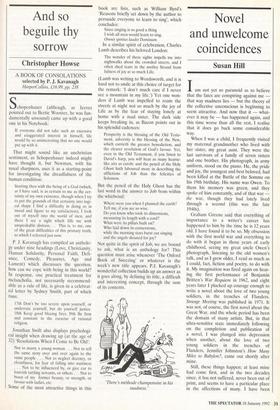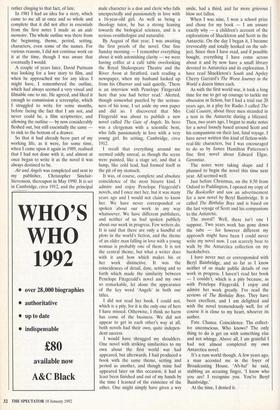Novel and unwelcome coincidences
Susan Hill
Iam not yet so paranoid as to believe that the fates are conspiring against me that way madness lies — but the theory of the collective unconscious is beginning to seem attractive. And now that it — what- ever it may be — has happened again, and this time worse than all the rest, I realise that it does go back some considerable way.
When I was a child, I frequently visited my maternal grandmother who lived with her sister, my great aunt. They were the last survivors of a family of seven sisters and one brother. His photograph, in army uniform, stood on the piano. He, the pride and joy, the youngest and best beloved, had been killed at the Battle of the Somme on his 19th birthday. His name was Owen. To them his memory was green, and they spoke of him constantly, and of that war the war, though they had lately lived through a second (this was the late 1940s).
Graham Greene said that everything of importance to a writer's career has happened to him by the time he is 12 years old. I have found it to be so. My obsession with the first world war and everything to do with it began in those years of early childhood, seeing my great uncle Owen's photograph, listening to the old women's talk, and as I grew older, I read as much as I could, fact, fiction and poetry, to do with it. My imagination was fired again on hear- ing the first performance of Benjamin Britten's War Requiem in 1962, and eight years later I plucked up courage enough to write a novel about the love of two young soldiers, in the trenches of Flanders.
Strange Meeting was published in 1971. It was not, of course, the first novel about the
Great War, and the whole period has been the domain of many artists. But, in that ultra-sensitive state immediately following on the completion and publication of
a novel, I was plunged into depression when another, about the love of two young soldiers in the trenches of Flanders; Jennifer Johnston's How Many Miles to Babylon?, came out shortly after mine.
Still, these things happen; at least mine had come first, and in the two decade§
since, it has not suffered, never been out of print, and seems to have a particular place in the affections of many. I have been rather clinging to that fact, of late.
In 1981 I had an idea for a story, which came to me all at once and so whole and complete that it did not alter in essentials from the first notes I made as an aide memoire. The whole outline was there from the beginning, theme, period, setting, characters, even some of the names. For various reasons, I did not continue work on it at the time, though I was aware that eventually I would.
A couple of years later, David Puttnam was looking for a love story to film, and when he approached me for any ideas I might have, I remembered the outline, which had always seemed a very visual and filmable one to me. He agreed, and liked it enough to commission a screenplay, which I struggled to write for some months, before facing the fact that I am not, and never could be, a film scriptwriter, and allowing the outline — by now considerably fleshed out, but still essentially the same to sink to the bottom of a drawer.
So that it had already been part of my working life, as it were, for some time, when I came upon it again in 1989, realised that I had not done with it, and almost at once began to write it as the novel it was always destined to be.
Air and Angels was completed and sent to my publisher, Christopher Sinclair- Stevenson, thereupon in May 1990. It is set in Cambridge, circa 1912, and the principal
male character is a don and cleric who falls unexpectedly and passionately in love with a 16-year-old girl. As well as being a theology tutor, he has a strong leaning towards the biological sciences, and is a serious ornithologist and naturalist.
By August of that year, I was awaiting the first proofs of the novel. One fine Sunday morning — I remember everything about it with astonishing clarity — we were having coffee at a café table overlooking the Royal Shakespeare Theatre and the River Avon at Stratford, each reading a newspaper, when my husband looked up from his Observer and said quietly, 'There is an interview with Penelope Fitzgerald here that you had better read.' Alerted, though somewhat puzzled by the serious- ness of his tone, I set aside my own paper and did so. I discovered that Mrs Fitzgerald was about to publish a new novel called The Gate of Angels. Its hero was a clergyman with a scientific bent, who falls passionately in love with a very young girl. Its setting, Cambridge, circa 1912.
I recall that everything around me seemed oddly unreal, as though the scene were painted, like a stage set, and that a lump, like cold lead, had formed itself in the pit of my stomach.
It was, of course, complete and absolute coincidence of the most bizarre kind. I admire and enjoy Penelope Fitzgerald's novels, and I once met her, but it was many years ago and I would not claim to know her. We have never corresponded or spoken about our work in any way whatsoever. We have different publishers, and neither of us had spoken publicly about our work in progress. Few writers do. It is said that there are only a handful of plots in the world's fiction, and the theme of an older man falling in love with a young woman is probably one of them. It is not the central theme, but what a writer does with it and how which makes his or her work distinctive. It was the coincidences of detail, date, setting and so forth which made the similarity between Penelope Fitzgerald's novel and my own so remarkable, let alone the appearance of the key word 'Angels' in both our titles.
I did not read her book. I could not, which is a pity, for it is the only one of hers I have missed. Otherwise, I think no harm has come of the business. We did not appear to get in each other's way at all, both novels had their own, quite indepen- dent success.
I would have shrugged my shoulders. One novel with striking similarities to my own about the first world war had appeared, but afterwards. I had produced a book with the same theme, setting and period as another, and though mine had appeared later on this occasion, it had at least been finished and out of my hands by the time I learned of the existence of the other. One might simply have given a wry smile, had a third, and far more grievous blow not fallen.
When I was nine, I won a school prize and chose for my book — I am unsure exactly why — a children's account of the explorations of Shackleton and Scott in the Antarctic. On the day I began it, I became irrevocably and totally hooked on the sub-
ject. Since then I have read, and if possible bought, everything I have come across about it and by now have a small library devoted to Antarctica and its exploration. I have read Shackleton's South and Apsley Cherry Garrard's The Worst Journey in the World a dozen times each.
As with the first world war, it took a long time for me to get up courage to tackle my obsession in fiction, but I had a trial run 20
years ago, in a play for Radio 3 called The Cold Country, about three men stranded in
a tent in the Antarctic during a blizzard.
Then, two years ago, I began to make notes for a novel loosely based around Scott and his companions on their last, fatal voyage. I have never written this kind of fiction-with- real-life characters, but I was encouraged to do so by James Hamilton Patterson's fine first novel about Edward Elgar, Gerontius.
The notes were taking shape and I planned to begin the novel this time next year. All seemed well.
Just before Christmas, on the 8.50 from Oxford to Paddington, I opened my copy of
The Bookseller and saw an advertisement for a new novel by Beryl Bainbridge. It is called The Birthday Boys and is based on the last voyage of Scott and his companions to the Antarctic.
The moral? Well, there isn't one I suppose. Two years work has gone down the tube — for however different my approach might have been I could never write my novel now. I can scarcely bear to walk by the Antarctica collection on my bookshelves.
I have never met or corresponded with Beryl Bainbridge, and so far as I know neither of us made public details of our
work in progress. I haven't read her book — I couldn't, which is a pity because, as
with Penelope Fitzgerald, I enjoy and
admire her work greatly. I've read the reviews of The Birthday Boys. They have
been excellent, and I am delighted and wish the novel tremendously well, for of course it is close to my heart, whoever its author.
Fate. Chance. Coincidence. The collect- ive unconscious. Who knows? The only thing to do is get on with something else and not whinge. Above all, I am grateful I had not almost completed my own Antarctica novel.
It's a rum world though. A few years ago, a man accosted me in the foyer of Broadcasting House. 'Ah-ha!' he said, stabbing an accusing finger, 'I know who you are! I recognise you. You're Beryl Bainbridge.'
At the time, I denied it.



















































 Previous page
Previous page